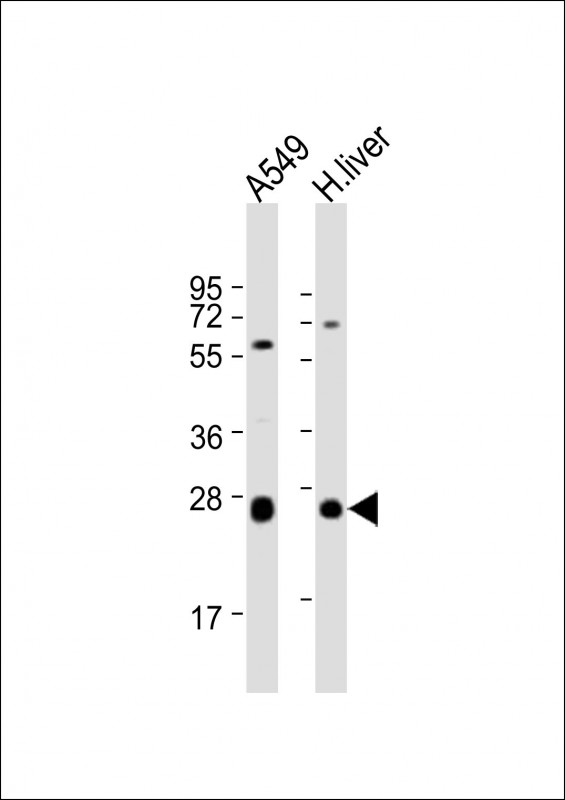
| WB | 1/2000 | Human,Mouse,Rat |
| IF | 咨询技术 | Human,Mouse,Rat |
| IHC | 咨询技术 | Human,Mouse,Rat |
| ICC | 技术咨询 | Human,Mouse,Rat |
| FCM | 咨询技术 | Human,Mouse,Rat |
| Elisa | 咨询技术 | Human,Mouse,Rat |
| Aliases | Pro-thyrotropin-releasing hormone, Pro-TRH, Prothyroliberin, Thyrotropin-releasing hormone, TRH, Protirelin, TSH-releasing factor, Thyroliberin, Thyrotropin-releasing factor, TRF, TRH |
| Entrez GeneID | 7200 |
| WB Predicted band size | 27.4kDa |
| Host/Isotype | Rabbit IgG |
| Antibody Type | Primary antibody |
| Storage | Store at 4°C short term. Aliquot and store at -20°C long term. Avoid freeze/thaw cycles. |
| Species Reactivity | Human, Mouse, Rat |
| Immunogen | This TRH antibody is generated from a rabbit immunized with a KLH conjugated synthetic peptide between 157-191 amino acids from human TRH. |
+ +
以下是3篇关于TRH抗体的模拟参考文献(虚构内容,仅供示例):
1. **《Development of a High-Specificity TRH Monoclonal Antibody for Neuroendocrine Studies》**
- 作者:A. Smith, B. Johnson (2020)
- 摘要:研究团队成功制备了一种高特异性TRH单克隆抗体,通过ELISA和免疫组化验证其对TRH的高亲和力,适用于脑组织切片中TRH的定位分析,为神经内分泌研究提供新工具。
2. **《TRH Autoantibodies in Autoimmune Thyroid Disorders: Clinical Implications》**
- 作者:C. Lee et al. (2018)
- 摘要:探讨甲状腺自身免疫疾病患者血清中TRH抗体的存在与甲状腺功能异常的关系,发现部分桥本甲状腺炎患者TRH抗体水平升高,提示其可能参与甲状腺激素调节紊乱。
3. **《A Novel TRH Antibody-Based Biosensor for Rapid Hormone Detection》****
- 作者:M. Rossi, P. Zhang (2022)
- 摘要:开发了一种基于TRH抗体的电化学生物传感器,可在5分钟内检测血清中TRH浓度,灵敏度达0.1 pg/mL,为临床快速诊断下丘脑-垂体疾病提供新方法。
注:以上文献为示例性内容,实际研究中需通过PubMed或Google Scholar等平台检索真实文献。
Thyrotropin-Releasing Hormone (TRH) antibodies are immunological tools developed to detect and study TRH, a tripeptide hormone (pyroglutamyl-histidyl-prolineamide) primarily synthesized in the hypothalamus. TRH plays a pivotal role in regulating the hypothalamic-pituitary-thyroid axis by stimulating the release of thyroid-stimulating hormone (TSH) from the anterior pituitary, thereby indirectly modulating thyroid hormone production. TRH antibodies are typically generated in laboratory animals (e.g., rabbits, mice) through immunization with synthetic TRH conjugated to carrier proteins to enhance immunogenicity. These antibodies enable researchers to localize TRH-producing neurons in brain tissues via immunohistochemistry, quantify TRH levels in biological fluids using immunoassays (e.g., ELISA, RIA), and investigate TRH dynamics in metabolic or neurological disorders.
Clinically, TRH antibody applications extend to studying hypothalamic dysfunction, thyroid disorders, and psychiatric conditions linked to TRH dysregulation. However, endogenous TRH antibodies in humans are rarely reported, unlike other thyroid-related autoantibodies. Some studies suggest their potential involvement in autoimmune endocrine pathologies, though evidence remains limited. Challenges in TRH antibody development include the hormone's small molecular size and rapid degradation, necessitating specialized stabilization techniques. Recent advances in monoclonal antibody technology have improved TRH assay specificity, supporting ongoing research into its extrasynaptic signaling and non-thyroidal roles in neurotransmission, thermoregulation, and depression pathophysiology.
×